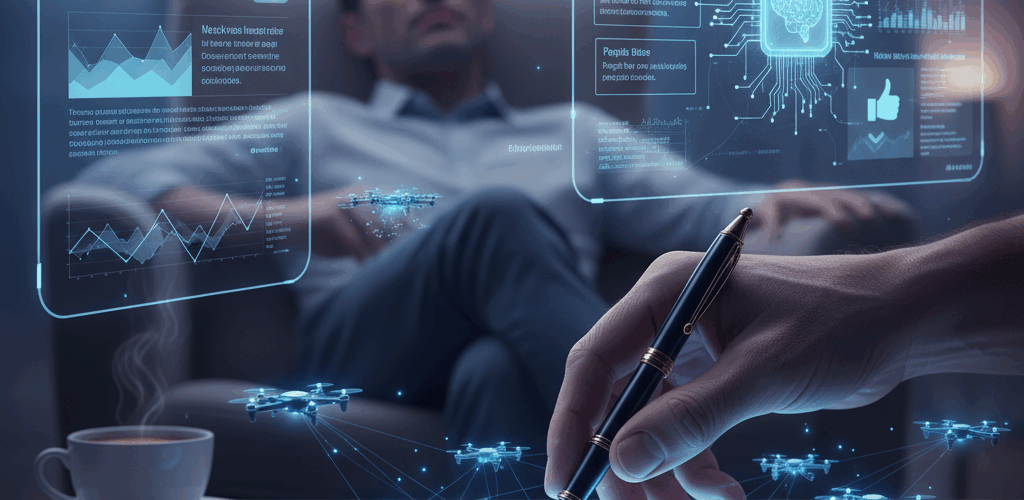EN
DE
NL
This article is the source of inspiration and a confirmation for my personal perceptions https://www.businessinsider.com/successful-linkedin-feed-bragging-anxiety-career-2025-10
For most of history, humans built tools to extend their physical strength.
Now we build systems that extend — and increasingly replace — our judgment.
Artificial Intelligence was supposed to augment decision-making.
Instead, it’s beginning to own it. The scary part? Not through force — but through convenience.
1. The silent influence layer
AI rarely takes control in obvious ways.
It doesn’t shout commands — it whispers suggestions:
-
“People like you also bought…”
-
“Here’s a better version of your sentence…”
-
“We recommend this candidate…”
-
“The model predicts this outcome…”
Each of those small nudges shifts behavior — not because we’re told to obey, but because the system makes it easy. And convenience is the most effective control mechanism ever invented.
We stop deciding because deciding feels unnecessary.
2. The comfort of outsourcing thinking
Human brains love efficiency. AI feeds that bias.
Why wrestle with uncertainty when the algorithm already has an answer?
Why test ideas when the system can A/B-test them for you?
Why trust intuition when data promises objectivity?
But objectivity doesn’t exist — it’s just someone else’s bias, automated at scale.
The more we let AI make the small calls, the harder it becomes to reclaim the big ones.
3. From assistance to authority
What began as “AI assistance” quickly evolves into AI governance:
-
In organizations: predictive systems shape hiring, pricing, and even layoffs.
-
In education: AI-graded essays decide who gets opportunities.
-
In politics: AI-optimized campaigns micro-target emotions to steer votes.
The shift is subtle but profound — human agency is no longer removed, it’s outcompeted.
Once AI performs better than us in narrow tasks, we stop questioning whether it should.
We just integrate it deeper.
4. When systems start writing reality
Generative AI doesn’t just analyze the world — it creates it. Text, images, voices, policies, even news are now system-generated.
If platforms like Bluesky can rewrite user posts “for clarity” or LinkedIn algorithms amplify “positive sentiment” over critique, we’re already in a world where AI curates not just what we see, but how we sound.
That’s not assistance — that’s narrative control. And because it feels helpful, nobody resists.
5. The illusion of human oversight
We love to say, “Humans are still in the loop.”But the loop itself is now designed by AI.
Dashboards, alerts, and recommendations frame our choices so tightly that “human judgment” becomes an afterthought. We click “approve” because everything on the screen already points to the same answer.
In practice, oversight becomes ritual — the corporate version of “I have read and agree to the terms and conditions.”
6. The new dependency
Dependence on AI won’t feel like dystopia — it’ll feel like efficiency.
-
We’ll use AI to write faster, until we forget how to think slower.
-
We’ll use AI to decide, until we forget what uncertainty feels like.
-
We’ll use AI to lead, until leadership becomes system management.
The danger isn’t rebellion; it’s relinquishment.
We won’t notice when control shifts — because we’ll have asked for it.
7. Reclaiming human agency
The answer isn’t to ban AI — it’s to design boundaries consciously.
AI can be a partner, but only if we stay sovereign in three areas:
-
Ethical context — Machines can simulate empathy but not morality.
Humans must define what “should” be done, not just what “can” be done. -
Meaning-making — AI can find patterns, not purpose.
We give outcomes their significance; without that, data is just noise. -
Critical distance — We must question the systems shaping our perception.
Ask not “what can AI do?” but “who benefits when it does?”
8. The next transformation: from efficiency to consciousness
- Digital transformation gave us productivity.
- AI transformation must give us awareness.
If the last decade was about automating processes, the next must be about protecting human autonomy.
Because without that, we risk building a perfectly efficient system that has no idea why it exists.
Closing thought
The question isn’t whether AI will take control. It’s whether humans will notice when it already has.Control in the age of AI doesn’t look like domination — it looks like comfort.
And that’s what makes it so dangerous.
An insight for you
Whe you seen more of my content, you might have noticed, that I am not someone, who’s following a hype. I am enthusiatic, but also aware and crtitical. IMHO this is curcial in this current world with all it’s challenges.
My post was genereated by ChatGPT 5 and after the English version was genererated by NotebookLM, I listened, to control if the meaning was covering my thoughts. While listening, a thought came up to my mind “The text, on which this podcast is based, was generated by AI. AI is telling me about the shift, of which AI is the source”. So prompted this to ChatGPT:
